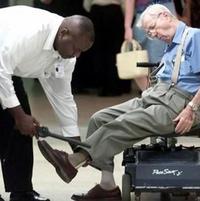-
U.S. shifts bio-defense R&D approach to "platform technologies"
The Obama administration’s new $5.9 billion bio-defense plan features a strategy to fund so-called “platform technologies” that apply to many different infectious disease threats, whether they be bioterrorism (anthrax), pandemics (influenza), or infectious diseases affecting the developing world (malaria); this money could provide an extra incentive to justify corporate R&D investments in vaccine, drug, and diagnostic technologies
-
-
U.K. defense cuts may benefit engineering industries
The U.K. defense industry is bracing itself for tens of thousands of private-sector job losses following the government’s budget cuts; for all the negativity of defense cuts, an influx of engineers into the employment market, combined with investment in infrastructure, raises the question of whether other industries might stand to benefit
-
-
ISC Solutions 2010, I: Solutions for real-world security challenges
ISC Solutions will open in New York on 3 November; formerly known as ISC East, the organizers say the change of name indicates a focus on showcasing best practice solutions which solve security challenges; ISC East was geared toward installing security contractors in the Northeast, and ISC Solutions, building on that history, now aims to offer a stage for manufacturers to present solutions and applications to end-user customers
-
-
Decreasing the world's rare earths dependence on China
China has one-third of the world’s known rare Earth elements, but produces and processes 97 percent of them; to decrease dependence on China, other countries can re-start rare earths mining, while addressing the environmental issues involved; recycle used rare earths (although the recycled material cannot always replace the original minerals), and develop alternatives
-
-
China says it will not use rare Earth minerals as diplomatic weapon
China has reassured the United States it has no intention of withholding rare Earth minerals (referred to as “rare earths”) from the market, the U.S. Secretary of State has said; China suspended export of the metals, key to some high-tech industries, to Japan after a diplomatic spat between the two countries
-
-
U.K. airlines support Broughton's criticism of U.S. security requirements

Martin Broughton, the chairman of British Airways, said some parts of the U.S.-inspired aviation security program are “completely redundant” and Britain should stop “kowtowing” to the United States every time the United States wants something done; Broughton said people should not be forced to take off their shoes or have laptops checked separately when checking in for flights; nor was there any need to pander to the Americans especially when it involves checks the U.S. government does not impose on U.S. domestic routes
-
-
ASIS 2010, II: New solutions to new -- and old -- security problems
Nearly 700 companies exhibited a wide array of security solutions for the public and private sector practitioner attendees at ASIS 2010; leading-edge innovations in access control, IP-based video surveillance, and explosion detection were among those demonstrated, as were new and enhanced service offerings
-
-
Northrop shows big-gun armed robot
Northrop took its Carry-all Mechanized Equipment Landrover, or CaMEL — a 60-inch-tall treaded vehicle capable of carrying an impressive 1,200 pounds of stuff — and put a massive .50 caliber M2 machine gun on it; Israel has already ordered 60 of them, and the U.S. Army is considering (after an unpleasant experience with an earlier armed robot in Iraq two years ago)
-
-
Boeing shows a plane-helicopter combo
The DARPA-funded, Boeing-developed DiscRotor combines the hovering ability and landing control of a helicopter with the high-speed, high-altitude flight capabilities of a plane, something that could be of use especially in military situations
-
-
Angel investors flee seed and start-up stage in first half of 2010
Angel investors committed fewer dollars in more deals in the first half of 2010, with seed and start-up stage investing declining to its lowest level in several years, a trend that soon could impact new ventures and job creation; total investments in the first half of 2010 were $8.5 billion, a decrease of 6.5 percent over the first half of 2009
-
-
ASIS 2010, I: Major market, technology trends
The four trends we noted on the floor of ASIS 2010: companies are reorganizing after acquisitions; a big emphasis on integrated solutions, more specifically: manufacturers are repurposing and re-grouping products to create specialized solutions for certain vertical markets; three buzz terms this year: cloud computing, whole building integration, and energy management; then there were IP cameras — everywhere, with manufacturers emphasizing education and training
-
-
PwC recruits cybersecurity talent with online puzzles
PricewaterhouseCoopers (PwC) found a new way to recruit IT security professionals; it aimed to dig out U.K. talent hidden under the radar by settling up tests for hackers at different levels of ability, uncovering teenagers and people already working in the IT profession; PwC says that winning these cyber contests is typically an indication of good problem solving, curiosity to learn, and a driven work ethic
-
-
BATS: Extending broadband communication, I
BATS system’s tight integration with the radios, along with the performance characteristics of the directional antenna, are used by BATS’ innovative software to create search patterns and predictive algorithms that automatically locate a desired connection point, establish communications, and track whether one or both of the wireless broadband radios are moving
-
-
U.S. Army tests robot batteries-and-bandwidth war-mules
The U.S. army remains determined to kit out all its ground troops with portable, wearable networking gear which will provide them with communications as well as an accurate idea of where everyone is; trouble is, when you have to generate your own wireless coverage as you go from the same kit, this means a lot of power — and this, in turn, means a crippling load of batteries; Lockheed Martin has a solution
-
-
Unease grows as Chinese telecom behemoth gains foothold in U.S.

China’s Huawei Technologies — a company linked to the People’s Liberation Army, and which has been repeatedly accused of stealing software designs and infringing on patents — is now the world’s second-largest telecom equipment supplier behind Ericsson of Sweden, and with Chinese government backing, it has sewn up major deals in Asia, Africa, and Latin America; a $3 billion in advanced wireless equipment deal with Sprint Nextel will give entry into the U.S. communication market — and this has lawmakers and security experts worried
-
- All
- Regional
- Water
- Biometrics
- Borders/Immig
- Business
- Cybersecurity
- Detection
- Disasters
- Government
- Infrastructure
- International
- Public health
- Public Safety
- Communication interoperabillity
- Emergency services
- Emergency medical services
- Fire
- First response
- IEDs
- Law Enforcement
- Law Enforcement Technology
- Military technology
- Nonlethal weapons
- Nuclear weapons
- Personal protection equipment
- Police
- Notification /alert systems
- Situational awareness
- Weapons systems
- Sci-Tech
- Sector Reports
- Surveillance
- Transportation
Advertising & Marketing: advertise@newswirepubs.com
Editorial: editor@newswirepubs.com
General: info@newswirepubs.com
2010-2011 © News Wire Publications, LLC News Wire Publications, LLC
220 Old Country Road | Suite 200 | Mineola | New York | 11501
Permissions and Policies
Editorial: editor@newswirepubs.com
General: info@newswirepubs.com
2010-2011 © News Wire Publications, LLC News Wire Publications, LLC
220 Old Country Road | Suite 200 | Mineola | New York | 11501
Permissions and Policies
